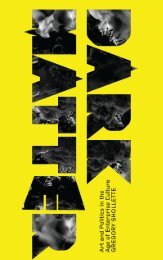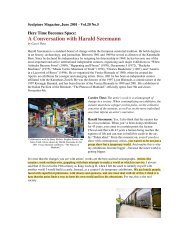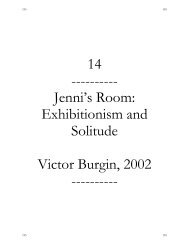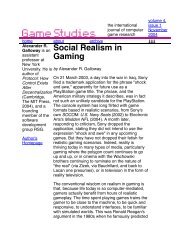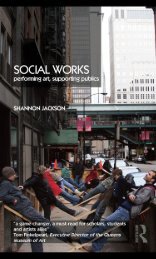Untitled
Untitled
Untitled
You also want an ePaper? Increase the reach of your titles
YUMPU automatically turns print PDFs into web optimized ePapers that Google loves.
Beyond Diversity<br />
And that is why the postmodern taste is fundamentally an antiradical<br />
taste. Radical political aesthetics situates itself always at the “degree zero”<br />
(degré zéro) of literary and visual rhetoric, as Roland Barthes defined it 1 —and<br />
that means also at the degree zero of diversity and difference. And this is also<br />
why the artistic avant-garde—Bauhaus, and so on—seem to be so outmoded<br />
today: These artistic movements embody an aesthetic sensibility for the political,<br />
not for the commercial market. There can be no doubt about it: every<br />
utopian, radical taste is a taste for the ascetic, uniform, monotonous, gray,<br />
and boring. From Plato to the utopias of the Renaissance to the modern,<br />
avant-garde utopias—all radical political and aesthetic projects presented<br />
themselves always at the degree zero of diversity. And that means: One needs<br />
to have a certain aesthetic preference for the uniform—as opposed to the<br />
diverse—to be ready to accept and to endorse radical political and artistic<br />
projects. This kind of taste must be, obviously, very unpopular, very unappealing<br />
to the masses. And that is one of the sources of the paradox that is<br />
well known to the historians of modern utopias and radical politics. On the<br />
one hand, these politics are truly democratic because they are truly universal,<br />
truly open to all—they are by no means elitist or exclusive. But, on the other<br />
hand, they appeal, as I said, to an aesthetic taste that is relatively rare. That<br />
is why radical democratic politics presents itself often enough as exclusive,<br />
as elitist. One must be committed to radical aesthetics to accept radical<br />
politics—and this sense of commitment produces relatively closed communities<br />
united by an identical project, by an identical vision, by an identical historical<br />
goal. The way of radical art and politics does not take us from closed<br />
premodern communities to open societies and markets. Rather, it takes us<br />
from relatively open societies to closed communities based on common<br />
commitments.<br />
We know from the history of literature that all past utopias were situated<br />
on remote islands or inaccessible mountains. And we know how isolated,<br />
how closed the avant-garde movements were—even if their artistic programs<br />
were genuinely open. Thus we have here a paradox of a universalist but closed<br />
community or movement—a paradox which is truly modern. And that<br />
means, in the case of radical political and artistic programs, we have to travel<br />
a different historical road than the one described by standard cultural studies:<br />
It is not a road from a premodern community to an open society of universal<br />
152 153



